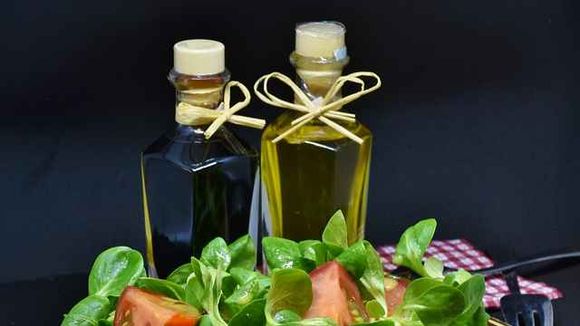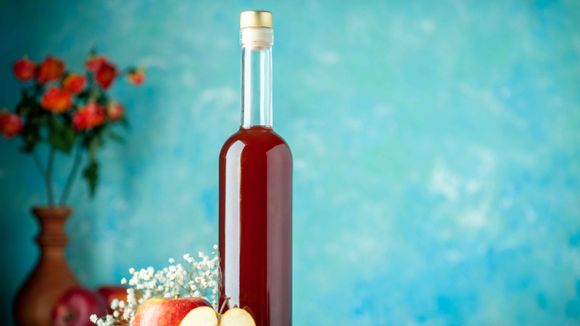What is vinegar?
The word "vinegar" comes from Latin and means "sour wine". Essentially, it is a fermented juice that has become acidic due to the growth of naturally occurring bacteria. Vinegar can be found in a variety of flavors, so it is not always sour. You will find out more about this in a moment.
Vinegar has long been used by chefs and culinary enthusiasts, starting 3,000 years ago in ancient Babylon. In fact, due to its importance in history and ubiquity around the world, vinegar has been called the "eternal spice." In addition to serving as a form of alcohol, the ancients also used the liquid to improve the taste of cooked food and to preserve and marinate foods. Vinegar really turns out to be multifaceted with all its uses, right?
As for its health benefits, evidence suggests it may offer health benefits, such as:
- Support weight loss
- Lowering cholesterol
- lowering blood sugar levels
- Improving the symptoms of diabetes
How to flavor vinegar
There are many flavors on grocery store shelves, ranging from fruit vinegars made with grapes to softer ones like rice vinegar made with rice. So where does vinegar get its taste from?
The main grain or fruit contributes a lot to the taste profile of a particular type of vinegar. Balsamic vinegar, for example, is made with grape must, which is essentially just boiled grape juice. This is the factor that gives balsamic vinegar its highly concentrated aromatic profile and syrup-like consistency. [ref. 1]
What does vinegar do in culinary terms

As already mentioned, vinegar has multiple applications, that is, universal. You probably use it to flavor dishes, whether as part of the marinade or for a salad, but vinegar can serve as more than a flavoring agent. [ref. 2]
Here are its other applications:
- Softens the taste of meat. You will often find vinegar used in marinades and brine recipes to help soften the taste of meat. This is because the acid helps break down these hard connective tissues and collagen, helping to keep the taste more delicate.
- Vinegar for canning pickles and preserves. One of the original uses of vinegar was to marinate foods to impart a bright, salty or sour taste and help keep foods longer. In short, the acid in vinegar helps slow down the natural rotting process of certain foods, which is why it is used in canning.
- Vinegar for cleaning. Cheaper vinegars, such as distilled white wine vinegar, are great for cleaning as their high acidity successfully breaks down accumulated dirt, grease and stains. Plus, vinegar doesn't contain any harsh chemicals, so it's a great way to incorporate it into your home cleaning routine.
- Vinegar for flavoring - Whether for watering fresh vegetables or refreshing caprese salad, the great taste of good vinegar is always felt in the dish.
Types of vinegar
In general, the type of vinegar is determined by what it is made of and how it is refined. Here are some of the most popular types of vinegar and their uses.
Balsamic vinegar
Balsamic vinegar is great for dressings, glazes, dips, marinades, reductions.
A staple in Italian cuisine, this aromatic liquid is actually made from pressed grape juice rather than fermented alcohol, giving it a softer and fruitier aromatic profile. The dark red liquid is traditionally made from grapes, but can be mixed with other fruits to give a deeper or more complex taste. It is loved for its sweet taste and concentrated, syrup-like texture, making it great for seasoning salads and dips. You can even use it to make a balsamic reduction for sweet and savory dishes.
Distilled white vinegar
This is the right kind of vinegar for pickling, cleaning, gardening, egg boiling, baking.
Distilled white acetic is an essential type of vinegar for every household. It is produced by distilling vinegar with a heat of steam, which kills all nutrients and essentially boils the liquid to pure acetic acid. For this reason, we do not recommend using distilled white vinegar for most cooking tasks.
This is the most preferred type of vinegar for pickling, as it is high in acetic acid, but still will not change the color of your food. It is also preferred for use in cleaning formulas, including self-prepared at home.
White wine vinegar
Suitable for seasoning, pickling, dressings, sauces, soups, stews, marinades.
As its name suggests, white wine vinegar is made from white wine. It is produced when the white wine is fermented and oxidized to acid and then distilled. Unlike distilled white vinegar, however, white wine vinegar has a milder taste profile that is subtly fruity. This makes it suitable for cooking.
Unlike red wine vinegar, white wine vinegar won't stain your foods, so it's a good choice for making brine. It is also a staple product in many classic sauces, including hollandaise and béarnaise.
Red wine vinegar

Red wine vinegar is the right choice for dressings, sauces, pickling, marinades.
Red wine vinegar is similar to white wine vinegar in that it is made from the grapes of said wine through a process of fermentation and distillation. In many ways, it serves the same purpose as white wine vinegar - it can be integrated into all sorts of sauces and dressings - but is not preferred for brine or pickling due to its red color and its potential to leave stains.
It is a must for classic dishes such as red wine vinaigrette and can be used for pickles. It is also used in minionnet, the classic sauce, poured on fresh oysters.
Sherry vinegar
Suitable for dressings, glazes, dips, marinades, reductions.
Sherry vinegar is a Spanish and Basque staple food produced by fermentation of fortified wine in oak barrels. This gives it a well-shaped, complex flavor profile and amber color. Although by no means as popular as balsamic vinegar, sherry vinegar has gained quite a following among dedicated chefs.
Apple cider vinegar
Apple cider vinegar is used for health purposes, pickling, marinades, sauces.
Apple cider vinegar is loved among people who care about their health and can do a lot of work in the kitchen. It is produced by fermenting sugar from apples, which converts them into acetic acid, creating a sharp, fruity and tart taste.
Studies have linked apple cider vinegar consumption to low blood sugar, weight loss, and good healthy skin, but what do chefs say about its uses? You can certainly use apple cider vinegar in the kitchen when making marinades, dressings, sauces and more, if you prefer a tart taste. [ref. 3]
Rice vinegar
Recommended for use in sauces, marinades, dressings, fried foods, rice.
A staple in Japan, Korea, China, and Vietnam, rice vinegar is made from rice wine and is commonly used in sauces, marinades, dressings, fried rice, fried foods, and sushi. As one of the few cereal vinegars on this list, rice vinegar brings a soft, subtly sweet and mild flavor profile to your cooking. This makes it ideal for dressings and marinades. This is probably the softest and least acidic type of vinegar in the selection and can serve as a universal option when you want to add a finish to the dish. [ref. 4]
Anti-cancer properties of vinegar
As it became clear, acetic acid has many culinary uses, and can also be taken for some health problems to relieve them. According to some people, acetic acid can affect the growth of cancer cells.
Most of the research related to acetic acid as a cancer treatment involves studies on animals or tissue samples, not living humans. In addition, some of these studies have found that cancer cells grow more aggressively in an acidic environment. Conversely, there is no evidence that cancer cells do not grow in alkaline environments.
An in vitro study in stomach cancer cells from rats and humans found that acetic acid effectively killed cancer cells. The authors suggest that there may be potential here to treat certain types of stomach cancer, but it is necessary to confirm the same action in humans. [ref. 5]
There is limited evidence that the consumption of vinegar (not just acetic acid) may provide protective benefits against cancer. For example, observational studies in humans found a link between vinegar consumption and a lower risk of esophageal cancer in people from China. 7 In yet another study it was stated that acetic acid immediately induced cell death of RGM-1, RGK-1 cells and KATO III cells in a concentrationdependent manner from 0.01% to 0.5%. Acetic acid at 0.5% for 1 minute induced cell death by 80%. [ref. 6]








